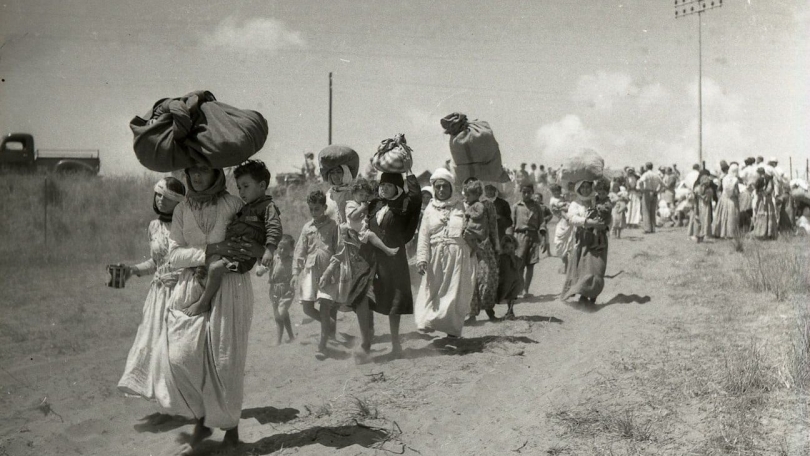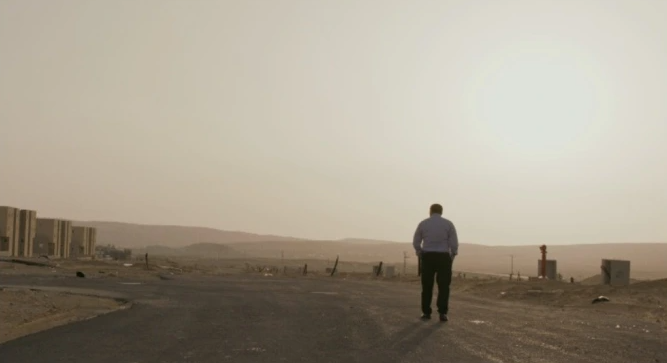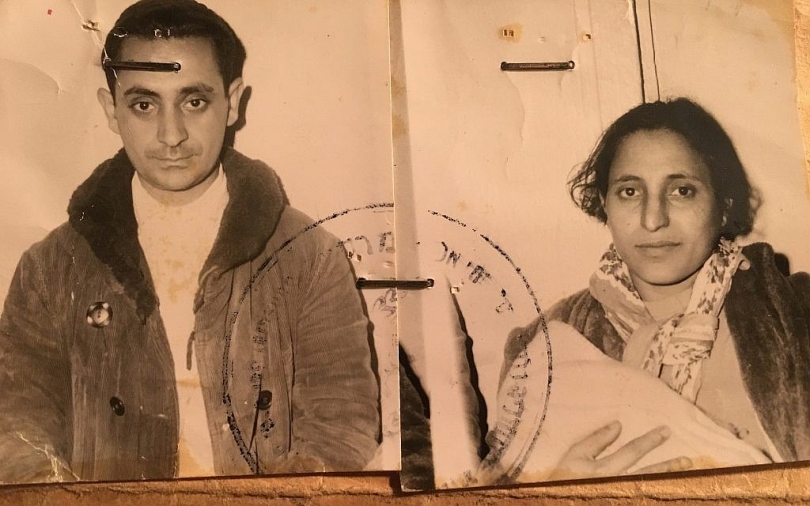|
|
||
|
Pro Tools
FILMFESTIVALS | 24/7 world wide coverageWelcome ! Enjoy the best of both worlds: Film & Festival News, exploring the best of the film festivals community. Launched in 1995, relentlessly connecting films to festivals, documenting and promoting festivals worldwide. We are currently working actively to upgrade this platform, sorry for the inconvenience. For collaboration, editorial contributions, or publicity, please send us an email here. User login |
Claus MuellerClaus Mueller is filmfestivals.com Senior New York Correspondent New York City based Claus Mueller reviews film festivals and related issues and serves as a senior editor for Society and Diplomatic Review. As a professor emeritus he covered at Hunter College / CUNY social and media research and is an accredited member of the US State Department's Foreign Press Center.
 Other Israel Film Festival 2022
The Other Israel Film Festival (OIFF) was established in 2007 in the Carole Zabar Center for Film at the Marlene Meyerson Jewish Community Center on Manhattan. Connected with several other film festivals located there, and the expanding Israel Film Center streaming site with more than 250 productions, the Manhattan JCC is probably the largest North American media center providing access to Israeli and Jewish media and culture. As distinct from other festivals with related themes, OIFF is exceptional because of its emphasis on outstanding productions that provide a critical narrative or documentary analysis of the past, present, and future of Israeli and Palestinian societies and groups. OIFF 2022 presented a hybrid format from November 3 -13 with fourteen documentaries and features, all accompanied by lengthy Q&A sessions with the audience. Besides the two productions reviewed here, several others selected this year addressed critical issues in Israeli-Palestinian relations. “H2: The Occupation Lab” by Idit Avrahami, is a case study of a Hebron neighborhood street occupied by the Israeli army for the last 54 years; “The Soldier’s Opinion” directed by Assaf Panitt and Shay Hazkani covers the Israeli army secretly analyzing their soldiers correspondence; and in “A Reel War:Shalal” Karmi Mandel shows how the defense system tries to prevent the use of material from a PLO film archive. Questions from the audience and comments by the filmmakers reflect a growing concern and skepticism about the developments in Israel and the rising potential for more violence. A young man articulated his detachment from Israel by stating “you do not need Israel for being Jewish”. Others, including Israeli filmmakers, place their hopes for progressive change in Israel on pressures by foreign countries, having the USA in mind. The recent changes in Israel point in the opposite direction. A new nationalistic right-wing Government has been formed by Netanyahu with strong religious coalition partners. Itamar Ben-Gvir, an ultranationalist from the Jewish Power party was appointed minister of internal security which includes police. Ben-Gvir opposes the creation of a Palestinian state, plans to expand settlements on the West Bank, and create a new national security force. The documentaries reviewed here, TANTURA and the French-Israeli THE FORGOTTEN ONES, supplemented by comments from my article about David Deri’s 2017 THE ANCESTRAL SIN, address the significant issues in assessing a country's conflicted past and the eradication of facts contradicting dominant political convictions that deflate the mythology of an Israel guided solely by moral and democratic considerations.
Alon Schwartz directed the 2022 documentary TANTURA, a case study of the evidence surrounding the massacre of more than 200 civilians in a Palestinian fishing village on May 22, 1948, by the Israel Defense Forces’ Alexandroni Brigade after the village had surrendered. Equally important are the observations by Schwartz of how the killings of civilians and other similar war crimes were officially and privately whitewashed. Teddy Katz, a student established an oral history interviewing 135 members of the Alexandroni Brigade and surviving Tantura residents and recorded more than 199 hours of audio tapes. Katz received a history Master degree from Haifa University. His work was covered by the press and the Alexandroni Veterans Association filed a suit forcing Katz to admit errors in his research, a statement he retracted 12 hours later. Courts, including the Israeli Supreme Court, ruled against him. Haifa university revoked his degree and removed his thesis from the library while leaving space for Nazi literature. Among judges hearing and rejecting his case were several that had previously written favorable reports about the Israeli army but did not review his evidence. Digitally enhancing the tapes, Schwartz discovered that several veterans confirmed their involvement with and their observation of the killing of civilians in Tantura. Others claimed amnesia or requested that what they told earlier to Katz be erased from the tapes. Some remembered details of soldiers killing many people, and others justified the killing or denied them. The recall by a few brigade survivors interviewed, some having reached their early 90 ages, was more fractured. A few admitted that they killed some civilians during the war but invoked the death of fellow Israelis or other justifications. The apparent amnesia was encouraged by the Alexandroni Veterans Association. Former Tantura residents and individuals from neighboring villages reported to Schwartz that they were ordered to bury about 270 dead civilians in a mass grave. Experts interviewed for the film maintain that the massacre and ethnic cleansing during the war of independence and subsequent wars was embedded in the political context and the leadership of Ben Gurion and his followers. As quoted in TANTURA, Gurion argued that “we have to do the utmost that Arabs flee the Galilei”. As a former brigade member put it more succinctly, “beat them up and burn them and do all kinds of things. Villages and towns destroyed by the IDF cause them to flee”. Ben Gurion requested that a certified narration be created showing that the 750,000 – 800,000 Palestinians displaced by the war had left freely. In 1988, the IDF archive was scheduled to release documents about the war of independence, but the government imposed a strict censure. The censured list of documents remains closed, but it includes files covering evacuation of Palestinian communities, cruelty or violent behavior towards Arabs, killings, and murders not in accordance with combat conditions, material harmful to the IDF, and any documents about mass graves. According to Alon Schwartz, this official whitewashing of Israel’s past was guided by the “objective of protecting the myth that we are the most moral army and society in the world”
THE FORGOTTEN ONES from 2021, directed by Michale Boganim, is a documentary road trip through Negev towns 70 years after Mizrahim or oriental Jews from the Middle East and North Africa were forced to settle there in provisional tent and shack housing. Boganim tracks down the path of her father and his associates who had organized the Black Panther movement to fight Israeli discrimination of oriental Jews. The film exposes the social, psychological, and economic impact on the Mizrahim settlement families over the following three generations. Far from considering themselves as being integrated and having a firm Israeli identity, many of the children and grandchildren of the early settlers and even some survivors featured by Boganim recall their status as outsiders institutionally rejected by mainstream Ashkenazi society. They vividly recollect many discriminations they experienced in education, work, and housing and still do today. Most impressive were the stories of several old women whose infants were removed from them under false pretexts to be adopted by presumably Ashkenazi women. When the documentary was screened in Israel these sequences created an uproar and often denials. Superb footage shows images of neighborhoods where the young ones grew up in slums. Rather than analyzing the official economic and political factors resulting in the settlement policy, Boganim focuses on the past and present experiences of the Mizrahi in Israel. The detailed and highly personalized descriptions provided by them are a powerful indictment of a society which had for many years a deeply implanted system of discrimination against Jews coming from Arab countries. Given the shifts in Israel’s political system, its institutional bases may have faded but the families of the affected individuals keep the memories alive and thus the potential for future ethnic conflict. What transpired in some statements is a strong bond with Arab culture and that the authorities failed to use this link to attenuate conflicts with Palestinians in the Israeli and occupied territories.
The 2017 Israeli documentary THE ANCESTRAL SIN by was shown at the 2018 New York Sephardic film festival. David Deri is from a Moroccan family familiar with forced settlement policy. Most viewers from the small New York Sephardic community knew of the discrimination of Sephardic Jews from Arab countries by the Ashkenazi power structure dominating Israel in its first three decades. But few were ever confronted by the compelling documentation which David Deri provided. As part of the official disbursement policy, Sephardic jews from Arab countries like Deri’s family were forced to settle in development towns like Yeruham, in the Negev, in sparsely inhabited former Arab areas. It had been cleared by armed conflicts and an official policy guided by demographic and military goals determined their disposition. Deri accessed formerly secret files and summaries of meetings by policy makers developing this official strategy and interviewed the victims of the official policies. The systematic forced settlements were based on well-organized policies articulated by Ashkenazi officials. Jews from Arab countries were labeled as ignorant, illiterate individuals without culture, and being more Arab than Jewish. For Ben Gurion, they experienced justified discrimination. Settlers leaving the assigned area lost the right to work and housing. More than 200,000 Jews left Arab countries for Israel. On arrival, they could not choose were to live and were trucked out to development towns, frequently unfinished or ready to be inhabited, but eventually were offered public housing. As Deri shows, the Jewish Agency proceedings were confidential. In following years Ashkenazi Jews coming from Poland could live wherever they wanted and selected urban areas. They had the option to acquire apartments they could, an option not available for those living in public housing. Claus Mueller, filmfestivals.com New York, NY
07.12.2022 | Claus Mueller's blog Cat. : Other Israel Film Festival TANTURA The Ancestral Sin THE FORGOTTEN ONES Documentary FILM FESTIVALS
|
LinksThe Bulletin Board > The Bulletin Board Blog Following News Interview with EFM (Berlin) Director
Interview with IFTA Chairman (AFM)
Interview with Cannes Marche du Film Director
Filmfestivals.com dailies live coverage from > Live from India
Useful links for the indies: > Big files transfer
+ SUBSCRIBE to the weekly Newsletter DealsAbout Claus MuellerThe EditorUser contributions |

























